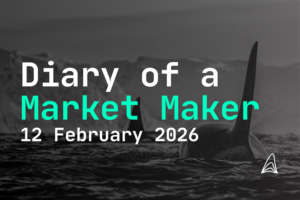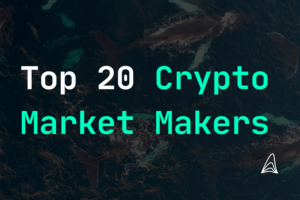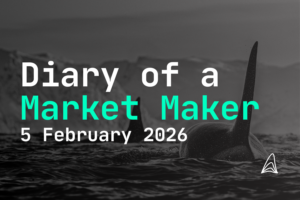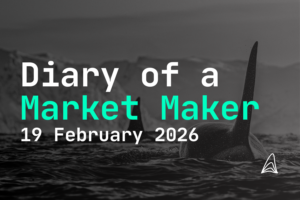
Token Generation Event (TGE) - What Is It?
- Jakob Brezigar
- Last updated: 04.March 2024
- Reading time: 4 min
In the world of blockchain, where the only thing more varied than the types of tokens are the ways to lose your password, Token Generation Events (TGEs) stand out as a beacon of creation and opportunity. Essentially, a TGE is the process through which new tokens are born and introduced to the crypto market, serving as the inaugural step for digital assets to begin their journey in the vast, decentralized ecosystem of blockchain.

Table of Contents
What is a Token Generation Event (TGE)?
A TGE is a process where new tokens are created and introduced to the crypto market, marking the beginning of a digital asset’s journey on the blockchain.
How do different types of TGEs cater to various project needs?
TGEs, including ICOs, STOs, IEOs, and IDOs, offer diverse fundraising and regulatory compliance options, enabling projects to engage with the community and investors effectively.
What roles do tokens play in the blockchain ecosystem?
Tokens, ranging from transaction and security tokens to utility, platform, and LP tokens, enhance functionalities, user engagement, and the financial dynamics of blockchain projects.
Token Generation Events (TGEs) stand as a cornerstone in the burgeoning world of cryptocurrency, marking the inception of new tokens within the blockchain ecosystem. These events not only signify the technical generation of tokens but also herald the launch of innovative crypto projects aiming to leverage blockchain technology for a myriad of uses, from simplifying transactions to redefining asset ownership.
At its core, a token generation event involves the creation and initial distribution of digital tokens, often facilitated by smart contracts on blockchain-based networks, paving the way for a project’s development and engagement with the broader crypto community.
Key Takeaways
- Token Generation Events (TGEs) mark the creation and distribution of new tokens, catalyzing the growth of innovative blockchain projects.
- Coins and tokens differ, with tokens offering diverse functionalities beyond mere currency, including access to services and digital ownership.
- Various TGE types like ICOs, STOs, IEOs, and IDOs cater to different regulatory and community needs, facilitating secure and compliant fundraising.
- Tokens, including transaction, security, utility, platform, and LP tokens, play pivotal roles in enhancing blockchain ecosystem functionalities and user engagement.
- TGEs and the tokens they generate are central to the expansion of decentralized finance, offering novel investment opportunities and democratizing access to financial services.
What are Coins and Tokens?
In the crypto space, understanding the distinction between coins and tokens is pivotal. Coins, such as Bitcoin or Ethereum, function as digital currencies designed for transactions and are native to their respective blockchain. Tokens, on the other hand, represent a broader spectrum of assets or rights, managed on existing blockchains. These can range from utility tokens granting access to services, to security tokens embodying investment assets, and even governance tokens offering voting power in decentralized networks. This diversity underlines the flexibility and innovative potential of tokens generated through TGEs.

How Crypto Market Makers Bring Value to the Token Generation Event?
At Orcabay, our role as crypto market makers in Token Generation Events (TGEs) is pivotal, ensuring liquidity and stability from the outset. Through a hypothetical case study, let’s consider our involvement in the TGE for “CryptoCraze,” a new digital asset. By committing to buy and sell CryptoCraze tokens, we provided immediate liquidity, essential for facilitating trades and establishing market confidence. This intervention not only helped stabilize CryptoCraze’s price during its critical launch phase but also attracted more participants to the ecosystem. This success translated into significant benefits for the CryptoCraze token, enhancing its market visibility and credibility, which are crucial for long-term growth and adoption in the crypto markets.
What are Token Generation Events and Which Types Do We Know?
Token Generation Events have become a fundamental mechanism for crypto projects to raise capital, distribute tokens, and kickstart their journey. Each type of token generation event—Initial Coin Offerings (ICOs), Security Token Offerings (STOs), Initial Exchange Offerings (IEOs), and Initial DEX Offerings (IDOs)—caters to different project needs and regulatory frameworks, offering a variety of avenues for projects to engage with investors and the crypto community.
What is an Initial Coin Offering?
The ICO is a pioneering model for token launch, enabling projects to raise funds directly from the public by offering new tokens. This form of public sale has been instrumental in bringing numerous blockchain innovations to life, though it has also prompted discussions about regulatory oversight due to its largely unregulated nature in the early days, leading to a heightened focus on compliance and investor protection.

Security Token Offerings
STOs provide a compliant alternative to ICOs, offering tokens that represent securities or assets, subject to the scrutiny of regulatory bodies. This approach combines the innovation of blockchain with the stability of regulated financial instruments, appealing to a segment of the market seeking secure investment opportunities in the crypto space.
Initial Exchange Offerings
IEOs represent a collaboration between crypto projects and established crypto exchanges, providing a platform for token sales that benefits from the exchange’s user base, security measures, and market reach. This model has gained traction for its ability to offer a more secure and streamlined investment process.

Initial DEX Offerings
IDOs allow for the decentralized and immediate trading of tokens on DEX platforms, embodying the ethos of open access and liquidity that is central to the DeFi movement. By facilitating a direct connection between projects and potential investors, IDOs offer a transparent and efficient path to market.
How Does a TGE Work?
A TGE unfolds through a series of meticulously planned stages, from the initial concept and whitepaper documentation to the intricate development of smart contracts and the strategic engagement with the community. This process is not just about raising capital but also about establishing a project’s footprint in the digital ecosystem, setting the stage for future growth and innovation.

Types of Tokens
The diversity of tokens generated during TGEs on a blockchain based network, reflects the breadth of possibilities within the blockchain domain.
Transaction Tokens
Designed primarily for payments and transfers, these tokens facilitate seamless transactions across the blockchain, enhancing efficiency and security. They provide a decentralized alternative to traditional finance by enabling direct, peer-to-peer transfers without intermediaries, cutting transaction times and costs. Their security features, like encryption and distributed ledgers, ensure faster and safer transactions, making them ideal for cross-border payments and offering a stable exchange medium in volatile markets.
Non-Fungible Tokens (NFTs)
NFTs as a crypto project have opened new horizons for digital ownership and creativity, allowing for the tokenization of art, collectibles, and more, each with its unique value and verifiability on the blockchain. By ensuring digital item uniqueness and scarcity, NFTs have created a market for digital creators and provided collectors with tradable assets of tangible value, fostering a vibrant ecosystem that merges art with technology.
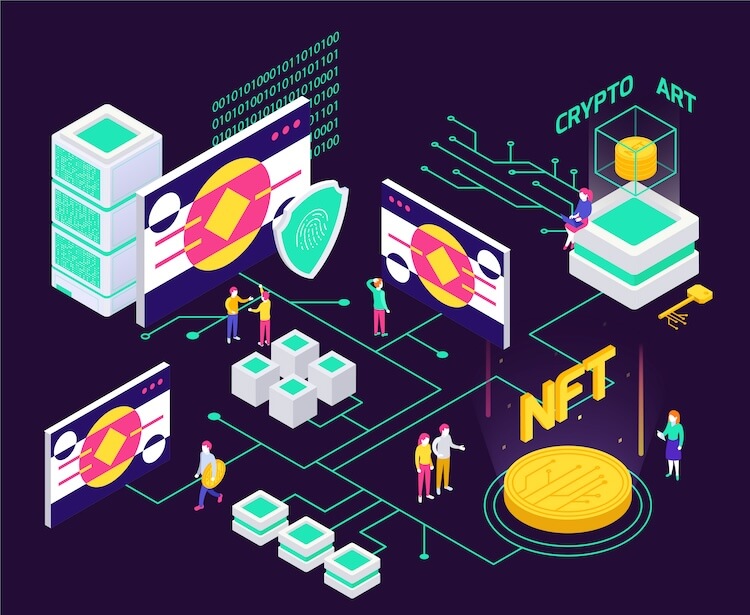
Security Tokens
Merging traditional asset ownership with blockchain technology, security tokens offer a regulated investment avenue, embodying real-world assets or equities. They bridge blockchain with financial markets, providing asset-backed, regulatory-compliant tokens that enhance investment accessibility and market liquidity, combining the security of traditional financial products with blockchain’s transparency and efficiency.

Platform Tokens
These tokens are integral to the ecosystems they serve, providing access to platform-specific services, governance, or utility, and driving engagement within the project’s community. They incentivize participation and reward users, fostering a sense of ownership and active engagement that supports the project’s growth and sustainability in the competitive blockchain space.

Utility Tokens
Utility tokens are the key to accessing services or benefits within a blockchain project, offering users functionality beyond mere investment, from accessing premium features to participating in governance. These tokens enhance user interaction within ecosystems, offering a direct exchange of value for services or privileges, and exemplifying blockchain technology’s potential to redefine digital platform engagement.
LP Tokens
Awarded to liquidity providers in the DeFi space, LP tokens symbolize a stake in a liquidity pool, entitling holders to a share of transaction fees and a voice in the platform’s future. They incentivize liquidity provision, rewarding users with a share of fees and ensuring platforms have the capital to operate efficiently, reflecting DeFi’s innovative approach to finance and governance.

Summary
Token Generation Events mark a pivotal transition in the lifecycle of blockchain projects, embodying the intersection of innovation, community, and finance. As the blockchain landscape continues to evolve, the role and impact of TGEs are set to expand, reflecting the sector’s dynamic growth and the endless potential of tokenized assets. Understanding the nuances of TGEs and the diverse types of tokens they introduce offers a glimpse into the future of finance, characterized by decentralization, inclusivity, and innovation.
Disclaimer: The information provided in this article is for informational purposes only and does not constitute financial, investment, or other professional advice. All opinions expressed herein are solely those of the author and do not represent the views or opinions of any entity with which the author may be associated. Investing in financial markets involves risk, including the potential loss of principal. Readers should perform their own research and consult with a licensed financial advisor before making any investment decisions. Past performance is not indicative of future results.

Jakob Brezigar
Jakob, an experienced specialist in the field of cryptocurrency market making, boasts an extensive international presence. With Orcabay, he has skillfully managed major operations and deals for a wide array of global stakeholders.

